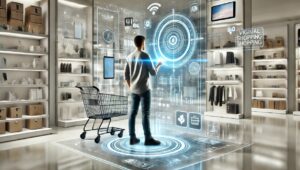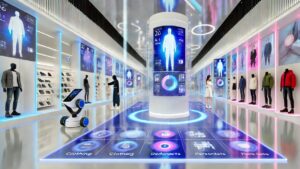
Future of Shopping: Smart Contracts and Automated Retail Experiences
An enormous transformative wave has hit shopping in terms of smart contracts and automation. As cryptocurrencies continue to influence retail trends, with even meme-based currencies like Dogs coin price movements affecting consumer behavior and merchant adoption, years of traditional shopping practices are coming to an end.
Even as Solana Price fluctuations demonstrate the growing mainstream acceptance of digital currencies in retail, technology now takes the load into its arms; bookstores and go stores are opening to this illumination.
The revolution of retail marries blockchain with artificial intelligence to provide seamless, sophisticated shopping experiences.
How the Future of Shopping Can Change with Smart Contracts and Automated Retail Experiences?
What Are Smart Contracts?

An intelligent contract is a self-implemented programmatic agreement that automates transactions without requiring any external human intervention. Such digital protocols automatically verify and enforce transactions when some predetermined conditions have been met.
In essence, this means instant payments, automatic refunds, and seamless delivery tracking for the shopper while running behind the scenes, making it much easier and more convenient.
The Evolution of Retail Automation
Modern stores are incorporating advanced technology to transform the shopping experience. Cameras and sensors track items as customers pick them up, eliminating the need for traditional checkout lines. Shoppers can walk in, select their items, and leave, with payments processing automatically through their mobile devices.
Smart shopping carts have evolved to become personal shopping assistants. These advanced carts display store maps, maintain digital shopping lists, and provide real-time pricing information.
They can even suggest recipes based on items in the cart and guide shoppers to specific product locations within the store.
Virtual Shopping Experiences

Augmented reality has revolutionized how we try products before buying. Shoppers can now visualize furniture in their homes, try on clothes virtually, or see how makeup looks on their faces through intelligent mirrors that simulate the application of different makeup products.
This technology reduces returns and increase customer satisfaction by helping shoppers make more informed decisions.
The Impact of Smart Contracts on Shopping
Smart contracts have transformed various aspects of retail transactions. When a customer makes a purchase, the payment processes instantly, and the shipping process begins automatically. Returns become effortless as smart contracts verify the returned item’s condition and process refunds without delay.
Loyalty programs have also evolved through innovative contract technology. Customer rewards are tracked and distributed automatically, with points or discounts appearing instantly in digital wallets.
This automation eliminates the need for physical loyalty cards and ensures rewards are always accurately calculated and immediately available, making customers feel valued and appreciated.
Store Operations in the Future
The retail environment is becoming increasingly intelligent. Smart shelves communicate with inventory systems to track stock levels in real time. When products run low, automatic reordering ensures popular items remain available. This system reduces waste, prevents stockouts, and optimizes inventory levels.
Customer service is evolving through automated systems that can answer common questions and solve routine problems. These systems learn from each interaction, becoming more effective over time.
However, human staff remain available for complex issues that require personal attention, such as product recommendations or resolving unique customer concerns.
Addressing Privacy and Security
As stores collect more customer data, privacy protection becomes crucial. Retailers must implement robust security measures to protect personal information and transaction data.
Customers need precise control over their data sharing preferences, with transparent policies about how their information is used and stored.
Technology Accessibility Considerations
While automated retail experiences offer numerous benefits, stores must ensure technology doesn’t create barriers for customers.
Alternative payment methods remain available for those without smartphones, and staff members are present to assist customers who prefer traditional shopping methods. Training programs help older customers adapt to new technology at their own pace.
The Future Shopping Experience

Tomorrow’s shopping experience will be highly personalized. Stores will anticipate customer needs based on previous purchases and preferences.
Products will effectively find customers through targeted recommendations, while payments and returns process automatically in the background. This creates a shopping environment that’s both more efficient and more enjoyable, sparking excitement about the future of shopping.
Economic Impact
Automated retail systems reduce operational costs for stores through decreased labor needs and improved inventory management. These savings can translate to lower prices for customers.
Additionally, smart contracts eliminate any transaction fees associated with traditional payment methods, further reducing costs throughout the retail ecosystem.
Preparing for Change
The transition to automated retail requires adaptation from both stores and shoppers. Customers benefit from familiarizing themselves with digital wallets and basic blockchain concepts. Understanding these technologies helps shoppers take full advantage of new retail features while maintaining control over their shopping experience.
Conclusion
Smart contracts and automation are recreating the retail landscape. Consequently, the revolution promises to make shopping more convenient, efficient, and personalized. Despite some challenges in implementation and acceptance, the gains from automated retail seem clear.
As the constant advancement of these technologies takes place, they will likely set conditions under which these shopping experiences are most attuned to consumer needs while increasing the ability of both shoppers and retailers to act in good faith.
The future of retail will offer not simply different methods of ‘buying things’ but will create an entirely new relationship between shoppers, stores, and the products they sell.
Author Profile

- Blogger by Passion | Contributor to many Business and Marketing Blogs in the United Kingdom | Fascinated with SEO and digital marketing and latest tech innovations |
Latest entries
 Online BusinessNovember 19, 2025Does Automated Data Drive Growth?
Online BusinessNovember 19, 2025Does Automated Data Drive Growth? TechnologyNovember 18, 2025How AI Social Media Tools Use Mobile Proxies to Avoid Detection?
TechnologyNovember 18, 2025How AI Social Media Tools Use Mobile Proxies to Avoid Detection? TechnologySeptember 26, 2025Make Review Videos Pop with Interactive AI Avatar Additions
TechnologySeptember 26, 2025Make Review Videos Pop with Interactive AI Avatar Additions TechnologySeptember 5, 2025How Beginners Can Choose a Safe and Trusted Platform for Playing Online Games?
TechnologySeptember 5, 2025How Beginners Can Choose a Safe and Trusted Platform for Playing Online Games?

